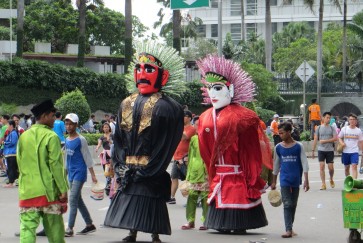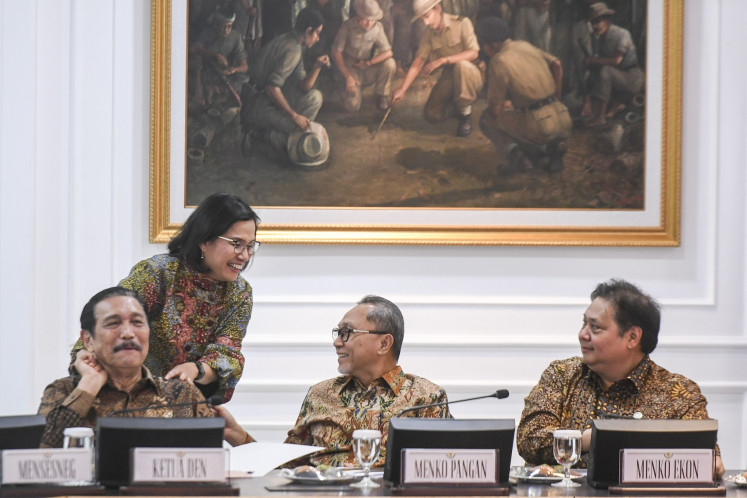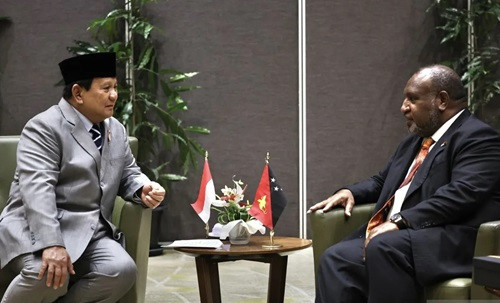A Dayak Wedding: An Affair to Remember
Rituals are performed during the two-day traditional wedding ceremony in Pantong village, Simpang Hulu subdistrict in Ketapang regency, West Kalimantan
Change text size
Gift Premium Articles
to Anyone

R
span class="caption">Rituals are performed during the two-day traditional wedding ceremony in Pantong village, Simpang Hulu subdistrict in Ketapang regency, West Kalimantan.
Gongs are belted. Drums are banged. Lively chatter and jokes are all around. A wedding celebration is set into motion.
Hundreds of people flocked to attend a two-day traditional wedding party in Pantong village, Simpang Hulu subdistrict in Ketapang regency, West Kalimantan.
The village, home to around 200 Dayak families, is located some 220 kilometers, or nearly a six-hour drive south of the provincial capital, Pontianak.
Before long, four lemaku (spokesmen), followed by the groom ' 27-year-old Sapril ' and his two pabayu (assistants), slowly stepped onto the wooden stairs heading to the main door. The bride, 24-year-old Anden, and her two assistants were still inside a bedroom.
The host representing the bride, 51-year-old Lokio, and dozens of relatives lined up, holding in their hands small bowls containing the tuak drink made of fermented sticky rice.
Before the groom and guests entered the room another lemaku, Rangin, stood in front of the door, casting a spell while swinging a chicken to and fro. Its feathers were pulled out and then sprinkled onto the entourage.
The rite aimed to ward off evil spirits from disturbing the marriage process and also to officially welcome the entourage.
A few minutes later the host and relatives presented tuak as ngalu ' a welcoming drink ' to the arriving guests.
Inside, eight lemaku sat cross-legged in the living room, whereas the bride and groom, accompanied by four pabayu, were kept isolated in the kitchen area.
Soon, eight pigs and some chickens were taken into the living room. They would be used in a ritual by the lemaku to ward off more evil spirits and to call out for good spirits. Their blood was sprinkled out of the window to get rid of the evil spirits.
The lemaku then moved to the kitchen where they would mark the bride's and groom's foreheads and crown them with the blood, still to ward off evil spirits.
Soon after that, the party began. Many people stamped their feet with joy, following the musical rhythm, while others sang rhymes and presented more tuak to guests.


The bride and groom donned colorful Dayak wedding costumes, along with traditional headbands.
A container holding four sugar cane stems wrapped with white and red cloth, an earthen jar, a nyabor (a traditional Dayak knife called a Mandau), a tayak (a colorful traditional basket), a traditional spear, silver bracelets and two pieces of boiled sticky rice in bamboo are placed in the middle of the living room.
Offerings, like incense, areca leaves, betel, cigarettes, as well as the leaves and branches of a banyan tree, are also placed in the room along with four boiled chickens, two pieces of pig's thigh, chicken livers, boiled eggs, yellow rice, rice flakes and four pieces of bamboo containing tuak.
For the Dayak Pantong community the customary wedding ceremony has been passed down for generations since before the arrival of Catholic missionaries sometime in 1940s.
Tulus, a senior customary chief at Pantong village, said many couples have taken up Christianity and received their marriage sacrament in church, but they still could not overlook the customary wedding.
From engagement to marriage, a couple would be scrutinized, so as to find out such things as whether they have close kinship or not. If this is cleared up, they are allowed to go ahead with the marriage.
For the customary wedding, another senior customary chief, Pean of Kelipor village, said the dowry includes an earthen jar, two bracelet silvers, a spear and a tayak.
Tulus, a father of eight, said that couples must meet the customary requirements and offer the dowry at least one year before the wedding. Currently, a customary wedding may cost some Rp 80 million (US$6,781).
The money is mostly used to purchase pigs, chickens, tuak, rice and other things needed for the celebration.
The Lemaku gets a cabak (reward) of two pieces of pig's thigh, a boiled chicken and two pieces of long bamboo filled with boiled sticky rice, while the pabayu brings home half of that.
Tulus said the formal marriage process includes the ngontik nsaring (dowry delivery to the bride-to-be) and is then followed by a nyurokng pinang to set the wedding date five days later.
Two months after setting the date the two groups would meet to have a motik pama, or discussion, to ensure the wedding would go as planned. Then, two weeks after, they would meet up again to determine further details for the wedding celebration.
After the wedding ceremony the bride and groom should refrain from going outside for a week. Only at the end of that period will they visit relatives to introduce their spouses.
One of the lemaku, 53-year-old Amin, hoped the customary wedding ceremony would prevail against time ' attracting young people to preserve the custom while, at the same time, promoting it to outside people.
Tulus agreed. 'The customary wedding may complete the marriage,' he says.
' Photos by Markus Mardius









